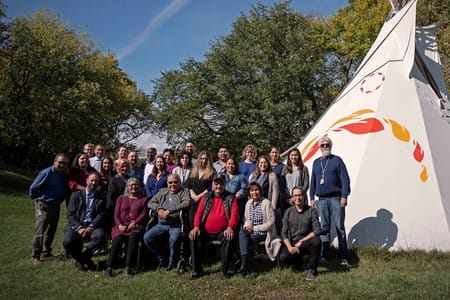Survivor Voices Integral to the NCTR

At the forefront of the National Centre of Truth and Reconciliation (NCTR) are the voices of Residential School Survivors, which have guided – and continue to guide – the centre’s development since it openedat the University of Manitoba in 2015.
The NCTR’s Governing Circle, with Residential School Survivor representation, advises on policies, priorities and activities, ceremonies and protocols, and prospective partners, but one of the group’s primary roles is to run a call for nominations and select the members of the Survivors Circle, which is composed entirely of First Nations, Métis and Inuit Residential School Survivors from across Canada.
“Five of the six [current members of the Survivors Circle] worked with the Truth and Reconciliation Commission (TRC), so they’re very strong and knowledgeable in current issues like Canada’s recent settlement agreements and the Independent Assessment Process,” says Laver Simard, who, in the NCTR’s governance secretary role, supports and assists the Governing Circle and Survivors Circle.
In 2010, Simard – then working with the TRC – was tasked with ensuring the TRC followed the Indigenous cultural protocols and traditions of each region during its work across the country. Now a member of the NCTR team, he continues the work of the TRC’s calls to action and engages with Survivors in NCTR’s planning, ensuring the Governing Circle’s and Survivors Circle’s input is incorporated into projects and initiatives.
In their roles, the Survivors Circle members provide advice and guidance to NCTR staff, the Governing Circle, the University of Manitoba and partners on a variety of topics that concern the Survivor community.
“The role is evolving – we’re getting a little bit more structured in terms of how we operate as one big team,” says Simard.
During the Survivors Circle’s quarterly meetings, Simard shares information for the members to take back to their territories and engage with other Survivors at a community level.
“I think one of the challenges is getting the information out to the Survivor community and letting them know that we’re here and that community and Survivor feedback is critical to the success of the NCTR,” says Simard. “Obviously we wouldn’t be here if it wasn’t for the Survivors, so our priority is making sure they’re listened to and when they bring issues to us, we address them from the community level.”
The Survivors Circle members also connect people in their communities with the NCTR. “Sometimes people in the communities don’t know who to phone if they want to access their records or if they want copies of their records,” says Simard.
In early 2019, the NCTR will put out a new call for Survivors Circle members. Moving forward, Simard hopes to work with the Survivors Circle on expanding their presence, both at the NCTR and on the university campuses.
“It helps us – as non-Survivors – understand and educate in terms of what [Survivors] went through and the impact the Residential School system had on their lives – and not only their own lives, but their families’ lives,” says Simard. “We want to pass on that education and that knowledge from the Survivors.”
“Sometimes, when people tend to talk about Residential Schools, they think it happened a long time ago,” he continues. “But it’s present history in many, many cases – the Survivors Circle and their families still struggle a lot with the impact of the schools, and they’ll struggle with that impact for the next few generations.”
The NCTR will continue to work collaboratively with its partners and other organizations across Canada to ensure Residential School Survivors’ experiences are preserved for future generations and Survivors continue to play a key role in all NCTR initiatives.
“Every week and probably every other day, across this country, we’re losing Survivors,” says Simard. “The number of Survivors is only going to decrease as time goes on, so it’s very important that while we have the opportunity, we engage them and listen to them.
In order for us to ensure this work continues, we have to keep that dialogue with the Survivors so their voices are heard and Residential Schools are never forgotten.”
